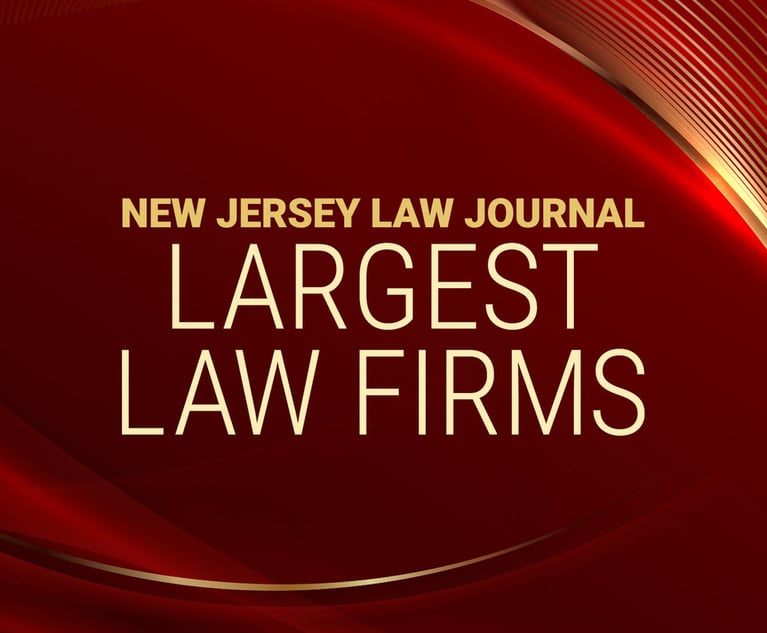 (L to R) Steven Hyman of McLaughlin & Stern and Norman Siegel, the former head of NYCLU, Siegel Teitelbaum & Evans, New York. (Courtesy photo)
(L to R) Steven Hyman of McLaughlin & Stern and Norman Siegel, the former head of NYCLU, Siegel Teitelbaum & Evans, New York. (Courtesy photo)Attorneys Who Handled Nurse's 2014 NJ Ebola Quarantine Talk Coronavirus Claims
Norman Siegel and Steven Hyman, who represented Kaci Hickox in legal fights against the state of New Jersey and others over a 2014 quarantine order for Ebola, predicted that few civil liberty claims filed over coronavirus restrictions would hold up in court.
April 01, 2020 at 02:00 PM
6 minute read
The original version of this story was published on National Law Journal
Attorneys who previously worked on legal challenges over an Ebola quarantine in the United States say the restrictions adopted in response to COVID-19 are likely to hold up in court, as long as they're in line with public health guidelines.
Norman Siegel, the former head of the New York Civil Liberties Union and now with Siegel Teitelbaum & Evans, and Steven Hyman, chair of McLaughlin & Stern's litigation department, represented Maine nurse Kaci Hickox as she faced quarantines in the U.S. after returning in 2014 from treating Ebola patients in Sierra Leone.
Hickox was quarantined for 80 hours in an isolation tent in New Jersey, and then faced a 21-day state-ordered quarantine in Maine over fears she could spread the virus. A Maine judge sided with Hickox in easing the restrictions placed on her, ruling she simply had to monitor her symptoms.
In 2015, Hickox filed a federal lawsuit against New Jersey officials over her quarantine there, and walked away in 2017 with a settlement that guaranteed rights to patients in New Jersey if they too were quarantined over the virus.
As states and federal officials issue orders and guidelines aimed at preventing the spread of the COVID-19 pandemic, the two attorneys who represented the nurse said the civil liberties questions presented by Hickox's differ greatly from those triggered by the coronavirus.
Ebola only becomes contagious once someone has symptoms, whereas coronavirus can be spread while an individual doesn't have symptoms, which the lawyers said means more drastic measures can be taken. Hickox was not symptomatic when she returned to the U.S.
Both lawyers, who have a wealth of experience in civil liberties cases, predicted few legal complaints would be made over the coronavirus-linked restrictions. If any did emerge, they said it was unlikely a court would uphold the challenge as long as the challenged policy was in line with public health advisories at the time it was issued.
"The balance is between public health, public safety, and individual rights to liberty, and it is different for the coronavirus, based on what we now know, as opposed to Ebola," Siegel said. "And what that results in, is it makes it more difficult to challenge the restrictions or limitations on the individual right to liberty that are accruing all over the country today."
To enforce then-Maine Gov. Paul LePage's order requiring Hickox to stay in her home for 21 days—the incubation timeline for Ebola—state officials petitioned a Maine state district court judge to issue a judgement that would have Hickox comply with the order.
At first, Judge Charles C. LaVerdiere ordered Hickox to stay away from public places and maintain a three-foot distance from others. But one day later, he lifted some of the restrictions, while still ordering Hickox to remain in contact with public health authorities on monitoring her symptoms.
"The state has not met its burden at this time to prove by clear and convincing evidence that limiting respondent's movements to the degree requested is 'necessary to protect other individuals from the dangers of infection,' however," LaVerdiere wrote. "According to the information presented to the court, respondent currently does not show any symptoms of Ebola and is therefore not infectious."
The judge did note the public fears surrounding Ebola, which had very little presence in the United States. He urged Hickox to keep those in mind during the remaining incubation period, even if those concerns stem from "misconceptions, misinformation, bad science and bad information."
"The court is fully aware that people are acting out of fear and that this fear is not entirely rational. However, whether that fear is rational or not, it is present and it is real," the judge wrote. "Respondent's actions at this point, as a health care professional, need to demonstrate her full understanding of human nature and the real fear that exists. She should guide herself accordingly."
Hyman, who is based in New York but has traveled to Vermont due to the pandemic, said the decisions being made around Hickox's case were "politically driven, not medically driven."
"Mainly Gov. [Chris] Christie and then Gov. LePage of Maine, who were making the decisions irrespective of what the CDC guidelines were. They were playing off the fear, not off of medical necessity," Hyman said.
However, the attorney said he did not believe the same situation was playing out today with respect to the coronavirus. Hyman said voices like Dr. Anthony Fauci, the director of the National Institute of Allergy and Infectious Diseases, are helping to guide officials to implement appropriate restrictions in response to the virus.
Siegel, speaking from quarantine in his New York City apartment, said Hickox stressed to him the importance of having scientific evidence in implementing restrictions over public health concerns.
After Hickox sued the New Jersey officials in 2015 over her forced quarantine, the parties settled with the agreement that the state would adopt a "patient's bill of rights" for other Ebola quarantines. Those protections include the right to challenge quarantine orders, have legal assistance, be given prior notice of hearings, communicate with others and a guarantee to privacy, as long as it doesn't interfere with vital public health interests.
Both Siegel and Hyman said those protections are only offered in cases of Ebola. But Siegel said the CDC appears to have adopted several of those measures in cases of federal quarantines.
According to a 2018 Emory Law Review article, the Department of Health and Human Services formally adopted the new regulations in 2017, and they offer due process protections like the right to legally contest a quarantine order and to have counsel appointed if an individual cannot obtain an attorney.
Siegel said that while public health officials should lead the charge in responding to the pandemic, he said he believed he had a role to play as well in educating the public about the public health dangers caused by the pandemic. He said he's received calls from some interested in challenging restrictions, but indicated that he was unlikely to take on any of those cases.
"I don't think we have panic yet," Siegel said. "But there is fear."
This content has been archived. It is available through our partners, LexisNexis® and Bloomberg Law.
To view this content, please continue to their sites.
Not a Lexis Subscriber?
Subscribe Now
Not a Bloomberg Law Subscriber?
Subscribe Now
NOT FOR REPRINT
© 2024 ALM Global, LLC, All Rights Reserved. Request academic re-use from www.copyright.com. All other uses, submit a request to [email protected]. For more information visit Asset & Logo Licensing.
You Might Like
View All
$113K Sanction Award to Law Firm at Stake: NJ Supreme Court Will Consider 'Unsettled Law' Frivolous Litigation Question
4 minute read
Which Outside Law Firms Are Irreplaceable, and Which Should Have Gotten the Ax Years Ago?
4 minute read
Largest Law Firms: New Jersey and Firmwide Attorney Count

Law Firms Mentioned
Trending Stories
Who Got The Work
Michael G. Bongiorno, Andrew Scott Dulberg and Elizabeth E. Driscoll from Wilmer Cutler Pickering Hale and Dorr have stepped in to represent Symbotic Inc., an A.I.-enabled technology platform that focuses on increasing supply chain efficiency, and other defendants in a pending shareholder derivative lawsuit. The case, filed Oct. 2 in Massachusetts District Court by the Brown Law Firm on behalf of Stephen Austen, accuses certain officers and directors of misleading investors in regard to Symbotic's potential for margin growth by failing to disclose that the company was not equipped to timely deploy its systems or manage expenses through project delays. The case, assigned to U.S. District Judge Nathaniel M. Gorton, is 1:24-cv-12522, Austen v. Cohen et al.
Who Got The Work
Edmund Polubinski and Marie Killmond of Davis Polk & Wardwell have entered appearances for data platform software development company MongoDB and other defendants in a pending shareholder derivative lawsuit. The action, filed Oct. 7 in New York Southern District Court by the Brown Law Firm, accuses the company's directors and/or officers of falsely expressing confidence in the company’s restructuring of its sales incentive plan and downplaying the severity of decreases in its upfront commitments. The case is 1:24-cv-07594, Roy v. Ittycheria et al.
Who Got The Work
Amy O. Bruchs and Kurt F. Ellison of Michael Best & Friedrich have entered appearances for Epic Systems Corp. in a pending employment discrimination lawsuit. The suit was filed Sept. 7 in Wisconsin Western District Court by Levine Eisberner LLC and Siri & Glimstad on behalf of a project manager who claims that he was wrongfully terminated after applying for a religious exemption to the defendant's COVID-19 vaccine mandate. The case, assigned to U.S. Magistrate Judge Anita Marie Boor, is 3:24-cv-00630, Secker, Nathan v. Epic Systems Corporation.
Who Got The Work
David X. Sullivan, Thomas J. Finn and Gregory A. Hall from McCarter & English have entered appearances for Sunrun Installation Services in a pending civil rights lawsuit. The complaint was filed Sept. 4 in Connecticut District Court by attorney Robert M. Berke on behalf of former employee George Edward Steins, who was arrested and charged with employing an unregistered home improvement salesperson. The complaint alleges that had Sunrun informed the Connecticut Department of Consumer Protection that the plaintiff's employment had ended in 2017 and that he no longer held Sunrun's home improvement contractor license, he would not have been hit with charges, which were dismissed in May 2024. The case, assigned to U.S. District Judge Jeffrey A. Meyer, is 3:24-cv-01423, Steins v. Sunrun, Inc. et al.
Who Got The Work
Greenberg Traurig shareholder Joshua L. Raskin has entered an appearance for boohoo.com UK Ltd. in a pending patent infringement lawsuit. The suit, filed Sept. 3 in Texas Eastern District Court by Rozier Hardt McDonough on behalf of Alto Dynamics, asserts five patents related to an online shopping platform. The case, assigned to U.S. District Judge Rodney Gilstrap, is 2:24-cv-00719, Alto Dynamics, LLC v. boohoo.com UK Limited.
Featured Firms
Law Offices of Gary Martin Hays & Associates, P.C.
(470) 294-1674
Law Offices of Mark E. Salomone
(857) 444-6468
Smith & Hassler
(713) 739-1250






